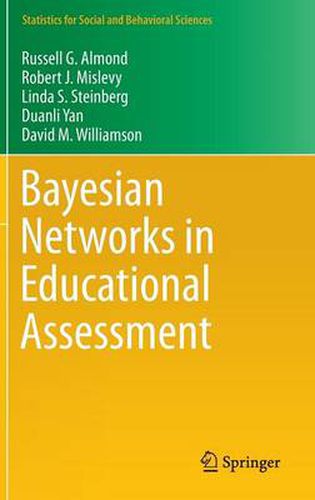Readings Newsletter
Become a Readings Member to make your shopping experience even easier.
Sign in or sign up for free!
You’re not far away from qualifying for FREE standard shipping within Australia
You’ve qualified for FREE standard shipping within Australia
The cart is loading…






This title is printed to order. This book may have been self-published. If so, we cannot guarantee the quality of the content. In the main most books will have gone through the editing process however some may not. We therefore suggest that you be aware of this before ordering this book. If in doubt check either the author or publisher’s details as we are unable to accept any returns unless they are faulty. Please contact us if you have any questions.
Bayesian inference networks, a synthesis of statistics and expert systems, have advanced reasoning under uncertainty in medicine, business, and social sciences. This innovative volume is the first comprehensive treatment exploring how they can be applied to design and analyze innovative educational assessments. Part I develops Bayes nets’ foundations in assessment, statistics, and graph theory, and works through the real-time updating algorithm. Part II addresses parametric forms for use with assessment, model-checking techniques, and estimation with the EM algorithm and Markov chain Monte Carlo (MCMC). A unique feature is the volume’s grounding in Evidence-Centered Design (ECD) framework for assessment design. This design forward approach enables designers to take full advantage of Bayes nets’ modularity and ability to model complex evidentiary relationships that arise from performance in interactive, technology-rich assessments such as simulations. Part III describes ECD, situates Bayes nets as an integral component of a principled design process, and illustrates the ideas with an in-depth look at the BioMass project: An interactive, standards-based, web-delivered demonstration assessment of science inquiry in genetics. This book is both a resource for professionals interested in assessment and advanced students. Its clear exposition, worked-through numerical examples, and demonstrations from real and didactic applications provide invaluable illustrations of how to use Bayes nets in educational assessment. Exercises follow each chapter, and the online companion site provides a glossary, data sets and problem setups, and links to computational resources.
$9.00 standard shipping within Australia
FREE standard shipping within Australia for orders over $100.00
Express & International shipping calculated at checkout
This title is printed to order. This book may have been self-published. If so, we cannot guarantee the quality of the content. In the main most books will have gone through the editing process however some may not. We therefore suggest that you be aware of this before ordering this book. If in doubt check either the author or publisher’s details as we are unable to accept any returns unless they are faulty. Please contact us if you have any questions.
Bayesian inference networks, a synthesis of statistics and expert systems, have advanced reasoning under uncertainty in medicine, business, and social sciences. This innovative volume is the first comprehensive treatment exploring how they can be applied to design and analyze innovative educational assessments. Part I develops Bayes nets’ foundations in assessment, statistics, and graph theory, and works through the real-time updating algorithm. Part II addresses parametric forms for use with assessment, model-checking techniques, and estimation with the EM algorithm and Markov chain Monte Carlo (MCMC). A unique feature is the volume’s grounding in Evidence-Centered Design (ECD) framework for assessment design. This design forward approach enables designers to take full advantage of Bayes nets’ modularity and ability to model complex evidentiary relationships that arise from performance in interactive, technology-rich assessments such as simulations. Part III describes ECD, situates Bayes nets as an integral component of a principled design process, and illustrates the ideas with an in-depth look at the BioMass project: An interactive, standards-based, web-delivered demonstration assessment of science inquiry in genetics. This book is both a resource for professionals interested in assessment and advanced students. Its clear exposition, worked-through numerical examples, and demonstrations from real and didactic applications provide invaluable illustrations of how to use Bayes nets in educational assessment. Exercises follow each chapter, and the online companion site provides a glossary, data sets and problem setups, and links to computational resources.